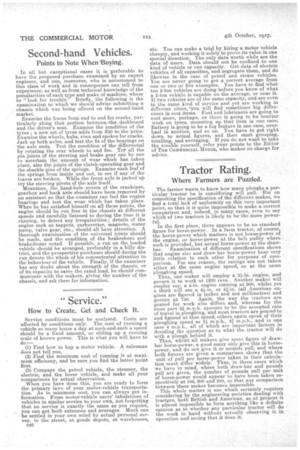"Service."
Page 12

If you've noticed an error in this article please click here to report it so we can fix it.
How to Create, Get and Check It.
Service conditions must be analysed. Costs are affected by conditions only. The cost of running a vehicle so many hours a day at such-and-such a speed should be a fixed amount, or sliding up a running scale of known power. This is what you will have to do :— (1) Find how to buy a. motor vehicle. A salesman does not tell you. . (2) Find the minimum cost of running it at maximum efficiency, and be sure you find the latter point first.
(3) Compare the petrol vehicle, the steamer, the electric, and the horse vehicle, and make all your comparisons by actual observation.
When you have done this, you are ready to form the primary laws of your motor-vehicle transportae tion. As to minimum cost, you can always get information. From motor-vehicle users' tabulations of vehicles in similar service to your own, not forgetting that no service is exactly the same as you require, you can get both extremes and averages. Much can be settled in your own mind by actual personal survey, in the street, at goods depots, at warehouses, c46 etc. You can make a trial by hiring a motor vehicle cheaply, and working it solely to prove its value in one special direction. T he only data worth while are the data. of users. Data should not be confined to one kind of vehicle or one capacity. Get data of electric vehicles of all capacities, and segregate them, and do likewise, in the case of petrol and steam vehicles. You are never going to get a correct average from one or two or five examples. You have to find what ten 2-ton vehicles are doing before you know of what a 2-ton whicle is capable on the average, or near it. If two vehicles are of the same capacity, and are even in the same kind of service and yet are working different cities, you will find sometimes big differences in cost items. Fuel and lubricants are going to cost more, perhaps, or there is going to be heavier work on tyres, mounting up . that item in one case. Battery is going to be a. big feature in one case, overhaul m another, and so on. You have to get right down to actual figures, and then start grouping, totalling, and averaging. If you do not want to take the trouble yourself, refer your points to the Editor of THE COMMERCIAL MOTOR, who makes no charge for advice.
























